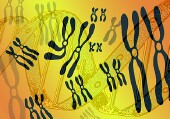
THURSDAY, July 15 (HealthDay News) — The gene in men that’s responsible for sperm production is 600 million years old and appears to be the only gene exclusively required for sperm production in creatures ranging from insects to mammals.
The so-called Boule gene’s function has remained unchanged throughout evolution, said the researchers at the Northwestern University Feinberg School of Medicine. They compared sperm from a fruit fly, sea urchin, rooster, fish and human. When they removed the Boule gene from a male mouse, the animal remained healthy but did not produce sperm.
The research, published July 15 in the journal PLoS Genetics, could have a number of implications for human health, such as possibly improving understanding of male infertility or offering a potential new target for a male contraceptive drug.
“This is the first clear evidence that suggests our ability to produce sperm is very ancient, probably originating at the dawn of animal evolution 600 million years ago. This finding suggests that all animal sperm production likely comes from a common prototype,” Eugene Xu, an assistant professor of obstetrics and gynecology, said in a university news release.
He added that the Boule gene is likely the oldest human sperm-specific gene ever discovered.
The finding that humans share this gene with a wide range of creatures is “really surprising because sperm production gets pounded by natural selection,” Xu said. “It tends to change due to strong selective pressures for sperm-specific genes to evolve. There is extra pressure to be a super male to improve reproductive success. This is the one sex-specific element that didn’t change across species. This must be so important that it can’t change.”
More information
The American Academy of Family Physicians has more about male infertility.

